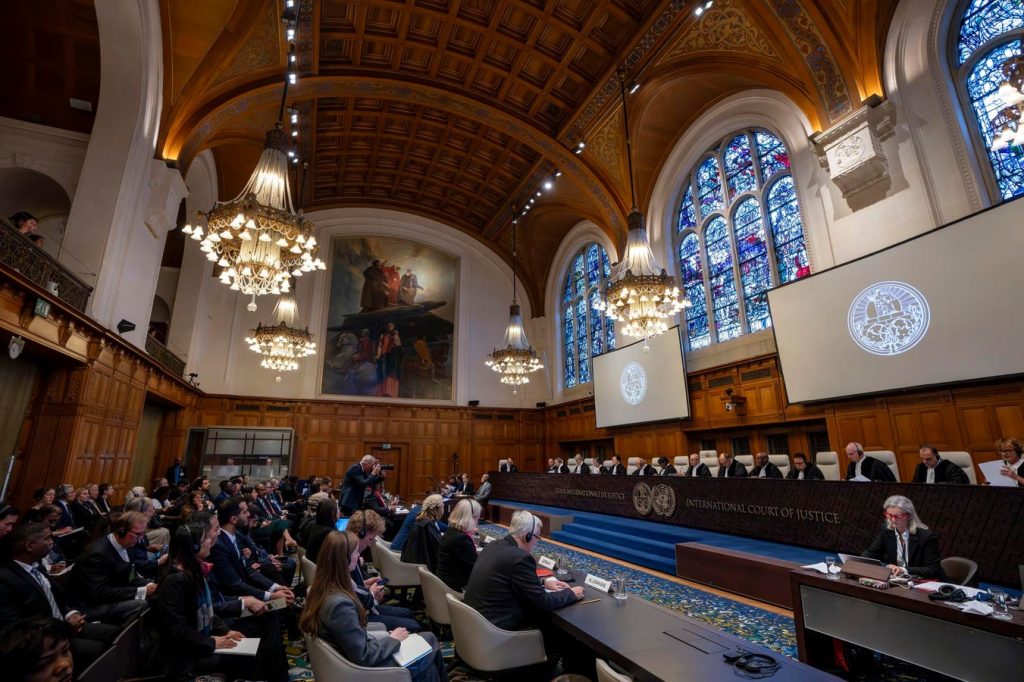A Legal Battle Over Climate Change Responsibility Unfolds at the International Court of Justice
The International Court of Justice (ICJ), also known as the World Court, recently concluded oral hearings regarding a pivotal advisory opinion on states’ obligations concerning climate change. This proceeding, initiated by the UN General Assembly at the request of Vanuatu, a small island nation acutely vulnerable to the impacts of climate change, seeks to clarify the legal responsibilities of countries in preventing and addressing climate change. While the ICJ’s advisory opinions are non-binding, they carry significant weight, potentially shaping future litigation and influencing the development of international climate law.
The hearings, held over two weeks in December, saw over 100 countries and organizations present their arguments before the 15-judge panel. At the heart of the debate lies the interpretation of existing international agreements, primarily the United Nations Framework Convention on Climate Change (UNFCCC) and the Paris Agreement. Developed nations, including the United States, Australia, and Germany, assert the principle of lex specialis, arguing that these specific treaties supersede any other international law on climate change, thus limiting their legal obligations. They contend that the Paris Agreement focuses primarily on procedural obligations, requiring countries to establish and report on their Nationally Determined Contributions (NDCs) outlining their efforts to reduce greenhouse gas emissions, without mandating specific emission reduction targets.
Conversely, developing countries, particularly those most vulnerable to climate change impacts, argue that the UNFCCC and the Paris Agreement provide a foundation, but do not encompass the full scope of states’ obligations. They emphasize that climate change infringes upon fundamental human rights, enshrined in international common law and the Universal Declaration of Human Rights. They advocate for reparations from major emitting countries, holding them accountable for the adverse consequences of their historical and ongoing contributions to climate change. Their interpretation of the Paris Agreement suggests that the NDCs create substantive obligations, requiring countries to take concrete actions to meet their stated emission reduction goals, not just report on their intentions.
The legal arguments hinge on the interpretation of Article 4 of the Paris Agreement. Paragraph 2 of this article mandates that countries "pursue domestic mitigation measures" to achieve their NDCs. Developed countries stress the word "pursue," interpreting it as a procedural requirement to make efforts, without guaranteeing specific outcomes. However, developing countries point to paragraph 3, which states that successive NDCs "will represent a progression" and reflect "highest possible ambition," implying a substantive obligation to actively reduce emissions and enhance ambition over time. This divergence in interpretation underscores the core disagreement regarding the legal force of the Paris Agreement’s provisions.
The potential implications of the ICJ’s advisory opinion are significant, particularly for the United States. The U.S. joined the Paris Agreement under President Obama through executive order, bypassing Senate approval based on the argument that the Agreement lacked legally binding obligations. A similar rationale was employed by President Biden upon rejoining the Agreement. However, if the ICJ determines that the Paris Agreement creates substantive legal obligations, it could challenge the legality of the U.S.’s participation without Senate ratification, potentially sparking a renewed domestic legal debate.
Following the oral hearings, four judges posed questions to the participating parties, seeking further clarification on key issues. One crucial question, posed by Judge Dire Tladi of South Africa, directly addresses the nature of the obligations under Article 4 of the Paris Agreement. Judge Tladi asked whether the "object and purpose" of the Paris Agreement and the broader climate treaty framework influence the interpretation of Article 4, and if so, to what effect.
Responses to Judge Tladi’s question highlighted the deep divisions between the parties. The United States reiterated its position that Article 4 primarily imposes procedural obligations, affording countries a "wide margin of appreciation" in their domestic mitigation efforts. The United Kingdom countered this, asserting that Article 4 contains both procedural and substantive obligations, emphasizing the importance of a "good faith interpretation" that generates "serious change." Small island developing states, such as Saint Lucia and Barbados, forcefully argued that major emitting states are misinterpreting the treaties, seeking to avoid their responsibility for climate change impacts.
Other countries offered more nuanced perspectives. Germany acknowledges substantive obligations related to the progression and ambition of NDCs, while the European Union distinguishes between procedural obligations regarding NDC submission and substantive obligations relating to their content. China emphasizes the binding nature of the obligation to pursue NDCs, suggesting an assessment based on due diligence. Canada highlights the political importance of increasing ambition, while Mexico underscores the purpose-driven interpretation of Article 4, suggesting that procedural requirements aim to promote substantive outcomes. The Organisation of African, Caribbean and Pacific States (OACPS) similarly stressed that NDCs are tools to ensure cessation of harmful conduct and provide reparations for past harm. These varying interpretations reflect the complexity of the legal issues at stake and the potential for the ICJ’s advisory opinion to significantly influence the future of international climate action.
The ICJ’s forthcoming advisory opinion will undoubtedly have profound implications for the international legal landscape of climate change. It could serve as a powerful catalyst for greater ambition and accountability in global climate action, potentially opening avenues for litigation and shaping the development of international law. The world awaits the Court’s decision with bated breath, recognizing its potential to reshape the trajectory of the fight against climate change.


